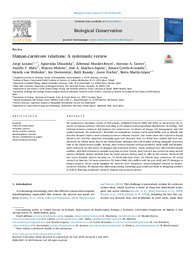Please use this identifier to cite or link to this item:
https://hdl.handle.net/11000/33891Full metadata record
| DC Field | Value | Language |
|---|---|---|
| dc.contributor.author | Lozano, Jorge | - |
| dc.contributor.author | Olszańska, Agnieszka | - |
| dc.contributor.author | Morales-Reyes, Zebensui | - |
| dc.contributor.author | Castro, Antonio A. | - |
| dc.contributor.author | Malo, Aurelio | - |
| dc.contributor.author | Moleón, Marcos | - |
| dc.contributor.author | Sánchez Zapata, José Antonio | - |
| dc.contributor.author | Cortés-Avizanda, Ainara | - |
| dc.contributor.author | von Wehrden, Henrik | - |
| dc.contributor.author | Dorresteijn, Ine | - |
| dc.contributor.author | Kansky PhD, Ruth | - |
| dc.contributor.author | Fischer, Joern | - |
| dc.contributor.author | Martín-López, Berta | - |
| dc.contributor.other | Departamentos de la UMH::Biología Aplicada | es_ES |
| dc.date.accessioned | 2024-11-18T11:08:32Z | - |
| dc.date.available | 2024-11-18T11:08:32Z | - |
| dc.date.created | 2019-07-02 | - |
| dc.identifier.citation | Biological Conservation 237 (2019) 480–4 | es_ES |
| dc.identifier.issn | 1873-2917 | - |
| dc.identifier.issn | 0006-3207 | - |
| dc.identifier.uri | https://hdl.handle.net/11000/33891 | - |
| dc.description.abstract | We conducted a systematic review of 502 articles, published between 2000 and 2016, to characterize the research on human-carnivore relations according to (i) temporal and geographical distribution, (ii) biology, (iii) relations between carnivores and humans, (iv) social actors, (v) drivers of change, (vi) management, and (vii) applied methods. We performed a detrended correspondence analysis and Kruskal-Wallis tests to identify and describe thematic clusters used in human-carnivore relations research. Our results show that research is deeply biased so far, and four important knowledge gaps were detected. First, we found more studies had been conducted in the Global North than in the Global South, although risks and benefits of living alongside carnivores exist in the Global South equally. Second, most research focused on large predators, while small and mediumsized carnivores are also source of damages and ecosystem services. Third, relations were often framed around conflicts, with little attention to possible ecosystem services. Fourth, most research was carried out using natural sciences methods, despite methods from the social sciences having much to offer in this context. Research fell into seven thematic clusters focusing on: (1) North-American bears, (2) African large carnivores, (3) social research in America, (4) meso-carnivores, (5) Asian felids, (6) conflicts with the grey wolf, and (7) damages to human property. These results highlight the need for more integrative, social-ecological research on humancarnivore relations. We discuss how addressing existing knowledge gaps could contribute to mitigating conflicts as well as fostering coexistence between humans and carnivore species. | es_ES |
| dc.format | application/pdf | es_ES |
| dc.format.extent | 13 | es_ES |
| dc.language.iso | eng | es_ES |
| dc.publisher | Elsevier | es_ES |
| dc.rights | info:eu-repo/semantics/openAccess | es_ES |
| dc.rights.uri | http://creativecommons.org/licenses/by-nc-nd/4.0/ | * |
| dc.subject | Carnivore conservation | es_ES |
| dc.subject | Ecosystem services | es_ES |
| dc.subject | Human-wildlife conflicts | es_ES |
| dc.subject | Interdisciplinary research | es_ES |
| dc.subject | Nature's contributions to people | es_ES |
| dc.subject | Social-ecological relations | es_ES |
| dc.subject.other | CDU::5 - Ciencias puras y naturales::57 - Biología | es_ES |
| dc.title | Human-carnivore relations: A systematic review | es_ES |
| dc.type | info:eu-repo/semantics/article | es_ES |
| dc.relation.publisherversion | https://doi.org/10.1016/j.biocon.2019.07.002 | es_ES |

View/Open:
8.pdf
2,38 MB
Adobe PDF
Share:
.png)
